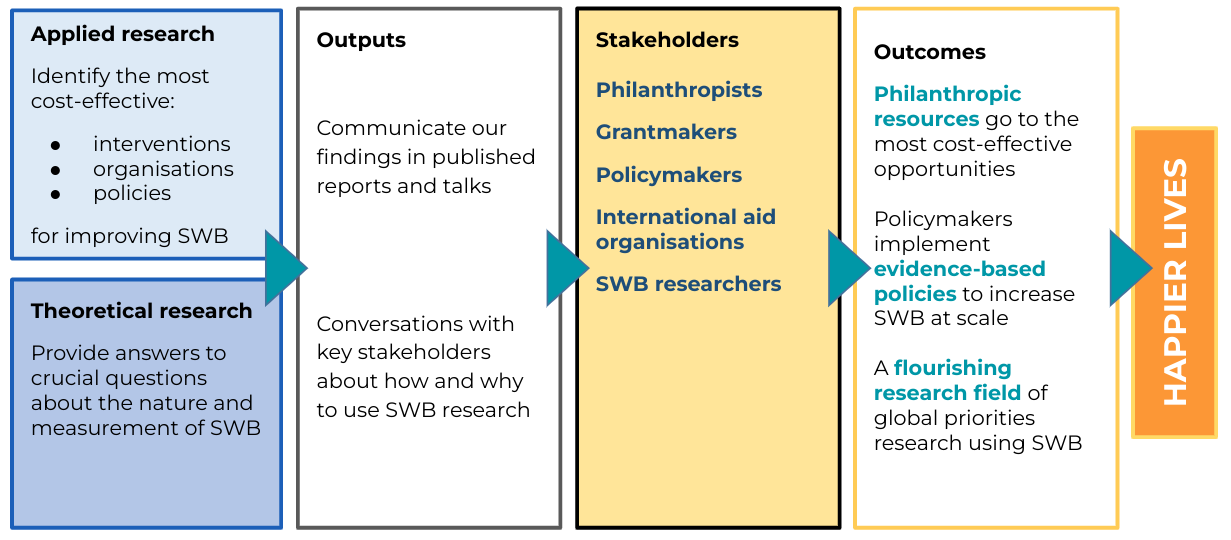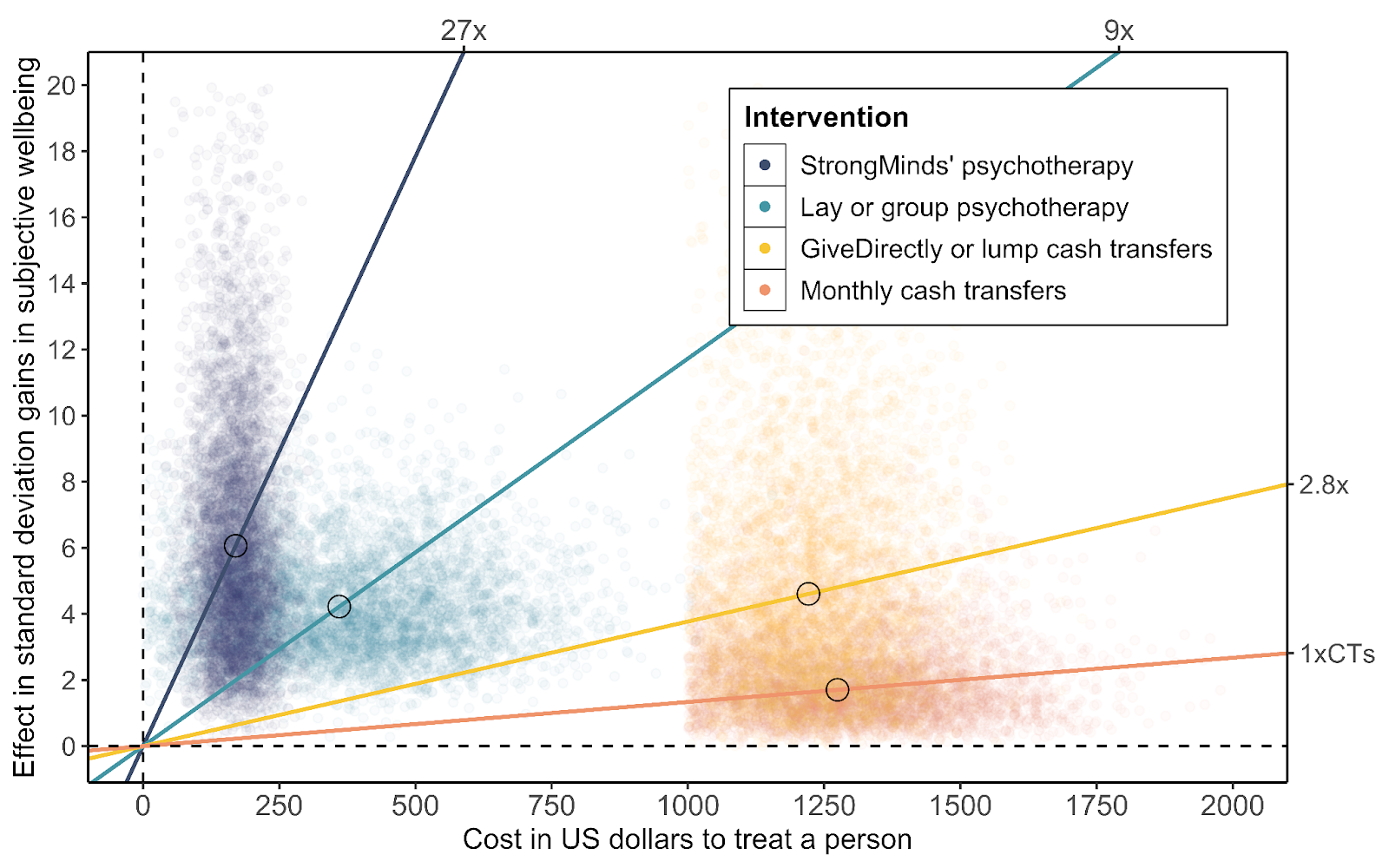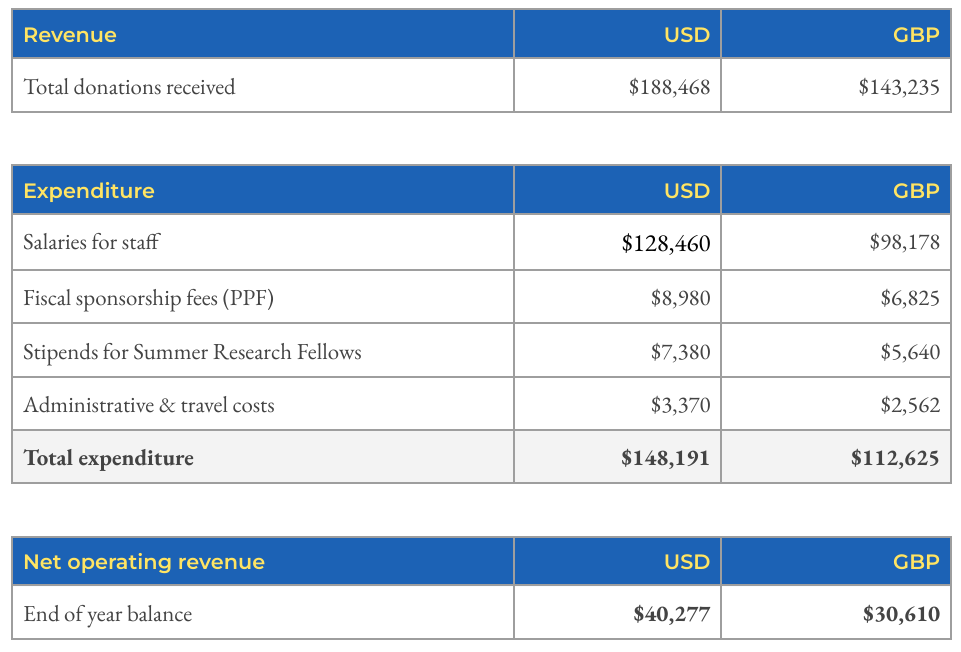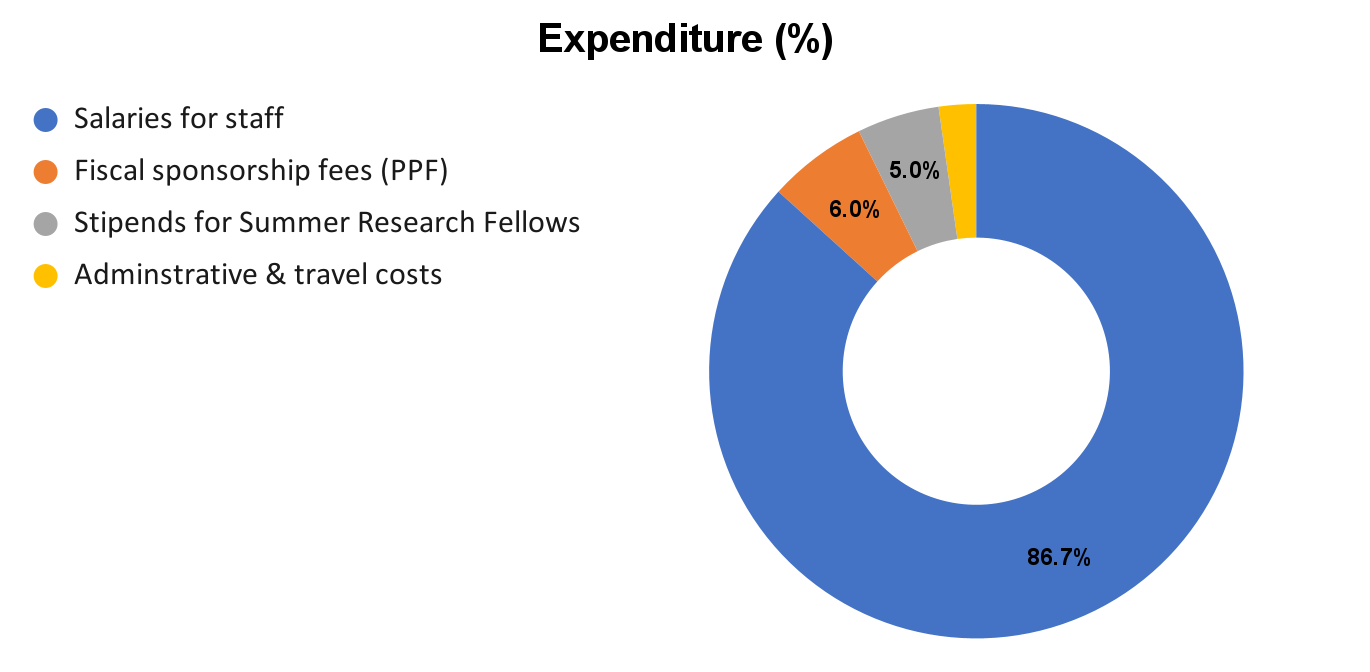Happier Lives Institute: 2021 Annual Review
By Barry Grimes, MichaelPlant @ 2022-04-14T19:55 (+52)
We’re pleased to share our 2021 Annual Review with you. This post also doubles as an AMA, so feel free to ask us about our work to date, our future plans, or anything else.
Before we get to the Annual Review, we’d like to make two announcements :
- We’re currently hiring for a Senior Researcher, a Grants Strategist, and an Operations Manager. If you want to get a better feel for what it’s like working at HLI, we think you’ll enjoy these blog posts on life as a researcher and an operations manager by members of our team.
- We’ve updated our cost-effectiveness comparison of psychotherapy and cash transfers to include an estimate of the effects on other household members. We now estimate that StrongMinds is 9 times more cost-effective than GiveDirectly (a slight reduction from 12 times in our previous analysis).
1. Director’s foreword by Michael Plant
In 2021, we took a significant step forward with the publication of our first substantial piece of empirical work comparing the cost-effectiveness of cash transfers and psychotherapy in terms of subjective wellbeing. We analysed data from more than 140,000 participants across 80 studies to show that providing group psychotherapy to people with depression in low- and middle-income countries is around 10 times more cost-effective than providing cash transfers to people living in extreme poverty. To the best of our knowledge, these are the first two meta-analyses assessing the cost-effectiveness of any intervention in terms of subjective wellbeing.
This is a surprising and important result. We’ve demonstrated that it’s possible to compare seemingly incomparable outcomes by measuring their effects in terms of subjective wellbeing. By doing so, we found a new and outstanding funding opportunity for philanthropists and policymakers. This provides further evidence that we shouldn’t rely on our intuitions about what makes people happier and should prioritise further research on the best ways to measure and increase global wellbeing.
The cost-effectiveness analyses of cash transfers, psychotherapy, and StrongMinds consumed most of our research capacity in 2021. However, we also published an updated research agenda and a new problem area report on mental health, to accompany our previous report on pain. We were featured in Vox, The New Statesman, The Times, BBC Radio 4, and the Clearer Thinking podcast and our work was discussed on social media by prominent thinkers including Alexander Berger, Chris Blattman, Tim Ferriss, Geoff Mulgan, Duncan Green, and Justin Sandefur.
I was delighted to welcome three new members to the team: Samuel Dupret (research), Joy Bitter (operations), and Barry Grimes (communications). Dr Caspair Kaiser joined our Board of Trustees and we said a fond farewell to our COO, Clare Donaldson, who joined the Lead Exposure Elimination Project. And for the first time, we were joined by a talented team of summer research fellows who explored a variety of applied and theoretical topics from our research agenda.
Our search for the best ways to measure and improve global wellbeing continues in earnest in 2022. We have a pipeline of promising ‘micro’-interventions to evaluate, including deworming, cataract surgery, and providing cement floors. We are tentatively expanding our scope to look for funding opportunities that can absorb over $20 million of philanthropic funding or be scaled up by policymakers. We also continue to interrogate key philosophical questions such as how to measure when a life is ‘not worth living’.
Of course, none of this would be possible without our wonderful staff, trustees, advisors, reviewers, fellows, volunteers, funders, and followers. Thank you for all that you do!
2. About us
The Happier Lives Institute conducts global priorities research using the lens of subjective wellbeing. Our vision is a world where everyone lives their happiest life. Our mission is to conduct and promote clear, useful, and rigorous research into how best to measure and increase global wellbeing.
2.1 Our approach
In a world with limited resources, we must prioritise the most cost-effective ways to improve people’s lives. But how can we meaningfully compare interventions that lead to different outcomes? Typically, we rely on indirect measures of wellbeing, like income and disability-adjusted life years, then make assumptions about how much good they do. But these rely on an outsider’s judgement of what we expect will improve people’s lives.
Most people agree that happiness is an important part of a good life. Some would say that happiness is the only thing that ultimately matters. Self-reports of happiness and life satisfaction are collectively known as measures of subjective wellbeing (SWB). They enable us to figure out what really matters for people’s wellbeing and directly compare changes in wealth and health using a single unit of measurement.
The last two decades have seen an explosion of research related to SWB. For the first time in history, we can use evidence to work out how best to improve global happiness - we don’t need to guess. Although we can and should discover what the priorities are, efforts to do this have barely begun.
Few academics in the wellbeing field think about what the global priorities should be and global priorities researchers are not making use of the ‘wellbeing lens’ - yet. Efforts to think about public policy in terms of wellbeing are starting (e.g. New Zealand’s wellbeing budget), but we are a long way from knowing what a policy manifesto based on wellbeing would look like. At the same time, guidance for philanthropists who wish to apply a wellbeing approach is almost non-existent.
The Happier Lives Institute exists to connect these fields, research the best ways to improve global happiness, and advise decision-makers.
2.2 Our theory of change
Global priorities researchers and decision-makers are not using subjective wellbeing (SWB) measures yet due to a mix of unfamiliarity with SWB research, theoretical worries about the measurement of subjective wellbeing, and practical concerns such as the availability of data and whether a wellbeing approach will reveal different priorities from the current ones. We believe that convincing researchers, philanthropists, and policymakers to use SWB measures will change funding and policy priorities, leading to happier lives.
So far, we’ve focused on integrating SWB into effective altruism. As no one else was trying to do this, it was the obvious gap and falls within our area of expertise. Rather than take our work directly to donors, we decided it would be more impactful to engage with existing organisations that advise donors. In a sense, we do “philanthropic advisory advisory”. Our aim is to get these organisations on board with the SWB approach (‘measuring good better’) and find new priorities, ultimately redirecting millions, perhaps billions, of dollars to the highest impact opportunities.
To make progress, we work in two main areas:
- Wellbeing measurement
- Advocating for SWB to be a central objective in decision-making.
- Explaining the latest research and methods within the field of wellbeing science.
- Conducting novel research into crucial open questions such as which measure of wellbeing is best and the comparability of wellbeing data between different people.
- Global priorities research
- Carefully examining the existing academic literature to identify the most cost-effective, evidence-based ways to increase global wellbeing.
In the future, we want to work out the policy priorities for governments too. See Section 4 for more details about our longer-term strategy.
Figure 1: Our theory of change

2.3 Our team
In 2021, our team expanded from three employees to five:
- Michael Plant - Founder & Director
- Joel McGuire - Research Analyst
- Samuel Dupret - Research Analyst
- Joy Bitter - Operations Manager
- Barry Grimes - Communications Manager
We plan to continue expanding our team and expect to hire two senior researchers in 2022. To get a flavour of what it’s like to work at HLI, we think you’ll enjoy these posts by Joel and Joy.
In September, our Chief Operating Officer, Clare Donaldson, moved to become a director at the Lead Exposure Elimination Project. We’re indebted to Clare for the significant contributions she has made to get HLI off the ground and we’re grateful for her continued advice and support.
We also welcomed Caspar Kaiser to our Board of Trustees. Caspar works alongside Michael as a Research Fellow at Oxford University’s Wellbeing Research Centre. He joins our existing trustees, Peter Brietbart and Sam Bernecker, to oversee the continued success of the organisation.
3. Progress in 2021
3.1 Research
3.1.1 Updated research agenda
From January to March, we took time to reflect on what we’d learned from our research in 2020. The result of this internal strategic review was a new research agenda for 2021/22 which spans three areas of focus.
Area 1: Foundational research into the measurement of wellbeing
- How best to convert between different measures
- How to compare existence to non-existence using subjective wellbeing scales
This work builds on our previous research on the plausibility of life satisfaction theories of wellbeing and the comparability of subjective self-reports.
Area 2: Applied research to evaluate the most cost-effective ways to increase wellbeing
- Estimating the impact of potentially highly-effective interventions in terms of SWB, including psychotherapy for common mental disorders, cataract surgery for blindness, and deworming tablets to improve lifelong earnings.
- Setting out how different moral assumptions—about what wellbeing is, the badness of death, and population ethics—alter those cost-effectiveness estimates and may alter the priorities
This work builds on our post using SWB to estimate the moral weights of averting deaths and reducing poverty and our meta-analysis of the impact of cash transfers on SWB (the final version was published in Nature Human Behaviour in January 2022).
Area 3: Understanding the wider context of global priorities
- Exploratory research into the plausibility and implications of the longtermist paradigm, the idea that the primary determinant of the value of our actions today is how those actions influence the very long-run future.
3.1.2 Report on global mental health
In May, we published an in-depth report on the global burden of mental health. The report set out how big the problem is, how much spending it receives, and how those resources are allocated. The report closes by outlining three broad avenues (summarised below) through which donors could fund useful work or individuals could undertake work themselves.
- Research: Identifying the root causes of mental illnesses, improving preventive interventions, advancing the scale-up of existing treatments, and developing new treatments or improving existing ones.
- Intervention delivery: Providing individuals with interventions that prevent or treat mental disorders or promote good mental health. This direct work could be carried out by funding, founding, or joining effective non-profit or for-profit organisations.
- Policy and advocacy work: Raising public awareness of mental health disorders to reduce stigma and pressing policymakers to provide more and better mental health services. This could include grassroots campaigning, journalism, lobbying, or work in think tanks at a national or international level.
3.1.3 Comparison of cash transfers and psychotherapy
In October, we published our first substantial piece of empirical work comparing the cost-effectiveness of cash transfers and psychotherapy in terms of subjective wellbeing. We conducted meta-analyses of the effect of each intervention in low-income countries, analysing over 80 studies with a total of over 140,000 participants.
We estimated that Strong Minds, a charity that provides psychotherapy, is around 10 times more cost-effective than the cash transfers provided by GiveDirectly. This puts StrongMinds on a par with the top life-improving charities recommended by GiveWell.
This is the first in-depth charity evaluation to compare poverty alleviation and mental health interventions using the same units (subjective wellbeing) rather than income and disability-adjusted life years (DALYs). Our analysis is built upon a broad evidence base rather than evaluating individual charities in isolation and we used Monte Carlo simulations, rather than point estimates, to account for our uncertainty in our final estimates (see Figure 2 below).
Figure 2: Cost-effectiveness of psychotherapy compared to cash transfers

The report generated a lot of interest both within and outside the effective altruism community including an in-depth write up in Vox, an episode of the Clearer Thinking podcast, and social media commentary from prominent influencers including Alexander Berger, Chris Blattman, Geoff Mulgan, Duncan Green, and Justin Sandefur.
3.1.4 Summer research fellowship
In July and August, we ran our first summer research fellowship. We received over 60 applications for the eight-week programme, from which we selected six fellows. Three fellows worked with Joel on estimating the cost-effectiveness of various micro-interventions including bednets, vitamin-A supplementation, conditional cash transfers, fistula surgery, nutrient fortification, and filters to reduce air pollution. The other fellows worked with Michael on crucial considerations including the influence of affective forecasting on cause prioritisation, establishing the neutral point on a 0-10 life satisfaction scale, and predicting trends in national wellbeing averages. You can read more about our 2021 Fellows, and their research projects here.
3.2 Engagement
Of course, producing research does not lead to happier lives without effective engagement with decision-makers (see our theory of change). Since 2019, we’ve focussed on developing relationships with grantmaking and research organisations that follow an effective altruism approach to cause prioritisation. We also participate in conferences and seminars, give talks to relevant interest groups, and discuss our research in the media. The following sections summarise our progress in these areas during 2021.
3.2.1 Stakeholders
Founders Pledge now use subjective wellbeing as their ‘in-house view.’ They have moved over $600 million since their foundation and have $5.7 billion pledged. We’ve agreed a formal research partnership with them to produce a series of intervention reports to inform the donation decisions of their members. This work is scheduled to start in April 2022.
GiveWell plans to publish reports on subjective wellbeing and psychotherapy in mid-2022. We have given feedback on their early drafts and you can read the notes from their most recent conversation with us here.
After reading our report on mental health, Open Philanthropy asked us for recommendations on how we would spend $20m+ a year to improve global wellbeing. This is a question we hadn’t considered in great depth, but it will form a key part of our research in 2022 and beyond.
3.2.2 Events
05 Feb 2021 |Fundamental issues in the measurement of subjective wellbeing | Wellbeing Research Centre, Oxford University
12 Feb 2021 | A discussion on the optimal distribution of wellbeing | Wellbeing Research Centre, Oxford University
03 Mar 2021 | Workshop on the economics of mental health | Experimental Economics Group, Max Planck Institute
27 Apr 2021 | Cash transfer programs symposium | Behaviourally Informed Organizations
05 Jul 2021 | The science of wellbeing: causes, consequences and policies | Wellbeing Research Centre, Oxford Universit
24 Nov 2021 | Mind & Behaviour Research Group | Centre for the Study of African Economies, Oxford University
24 Nov 2021 | Effective Altruism Medicine
30 Nov 2021 | Effective Giving Day
3.2.3 Media
24 Feb 2021 | Searching for lasting happiness | BBC Radio 4
Michael participated in a panel discussion alongside Mo Gawdat, Laurie Santos, and Emily Esfahani Smith
04 May 2021 | Why drugs should be not only decriminalised, but fully legalised | New Statesman
An article co-written by Michael and Peter Singer (who is an HLI advisor)
18 Oct 2021 | The sad fact is . . . Scotland is least happy nation in UK | The Times
Includes a quote from Michael
25 Oct 2021 | How to measure impact, and why we may have all been doing it wrong
Michael was interviewed by Spencer Greenberg on the Clearer Thinking Podcast
18 Nov 2021 | Is therapy the best way to make the world happier? | Vox: Future Perfect
A write-up of our psychotherapy research by Dylan Matthews
3.3. Lessons learned
3.3.1 Household spillovers
In our comparison of cash transfers and psychotherapy, we initially decided not to include the effects on other members of the recipient’s household. There is very little evidence and it seemed inappropriate to mix evidence-based empirical work with guesswork. However, we were grateful to Alexander Berger (Open Philanthropy) and James Snowden (GiveWell) for pointing out that intra-household spillover effects for psychotherapy could be much lower than those for cash transfers and this might alter our results significantly. We will publish an in-depth report on household spillover effects in April 2022, in which we reduce our estimate of the relative cost-effectiveness of psychotherapy from 12x to 9x.
3.3.2 Impact survey
We received 45 responses to our 2021 impact survey. Seven respondents changed their career plan due to our research, six changed where they donate (including Peter Singer), and three changed their research focus. They rated the quality of HLI’s research as follows: likelihood to recommend (8.7), usefulness (8.2), rigour (7.8).
The following quotes have been selected to illustrate some examples of our impact:
- “You guys are streets ahead of the competition and maintain EA's generally very high standard of rigour. Indeed, due to your willingness to get into the philosophical issues, I'd say your standard is even higher.”
- “I am now much more inclined to believe that psychotherapy improves wellbeing more or as much as cash transfers. My prior was that CTs would be more cost-effective. I am also now more convinced of CEAs using wellbeing data being feasible.”
- “[I] was agnostic about the relative effectiveness of psychotherapy and other interventions. Now slightly more optimistic that cost-effective mental health interventions are out there.”
- “It was compelling enough to make me seriously question my values. I'm not sure I would donate to StrongMinds instead of GiveDirectly, but I now have more reason to believe my emotions/gut feelings are doing some work here.”
- “I found the mental health problem area report particularly helpful. It was super informative and also very well written.”
The following quotes have been selected to illustrate some areas for improvement in 2022:
- “Clearer idea of funding opportunities would be awesome (and not just research -- I want to actually know how to improve SWB)...How do we get money out the door to address these issues in a cost-effective manner?”
- “Broadly I would like more on the measurement issues (i.e. the cardinality thesis). I think that there are a number of orgs doing purely the empirical EA work, trying to quantify cost-effectiveness, but less working on wellbeing measurement. I'm not saying to stop the other work which is of course very valuable, but just I think that that is an issue where you have comparative advantage, I guess - and it is somewhat neglected in general, given its importance.”
- “I’m not sure if it gets peer-reviewed by other researchers in the field, and as much as peer review has issues, some level of published research that is getting citations in the actual field of happiness research would be nice so I know this is taken seriously outside the EA/rationalist communities.”
- “Initially, I thought I had to revise my beliefs substantially. However, to be honest, after going through the actual report in more detail I was much less convinced by the methods - in particular, comparing standardised effect sizes on different measures in different populations isn't as strong a design as I had initially interpreted it to be. It's not that I think that the approach taken was unreasonable given practical limitations, but I just think that it could easily be an artefact caused by differences in the magnitude of the standard deviation.”
4. Plans for 2022
Our 2021 research has shown that it is problematic to rely on our intuitions about what makes people happier. A highly impactful intervention (psychotherapy) had been missed by the effective altruism community and we think other priorities may have been overlooked too. So we plan to fully examine the current funding priorities with EA, with the goal of using this new knowledge to make recommendations to international development organisations and, ultimately, governments.
In 2022, and beyond, we plan to examine interventions at three levels of scale:
- Micro-interventions (helping one person at a time) such as deworming, cataract surgery, digital mental health interventions, and cement flooring.
- Meso-interventions (object-level policies) such as lead paint regulation, access to opiates for pain relief, and drug liberalisation.
- Macro-interventions (large-scale societal changes) such as $20m+ funding opportunities and wellbeing policy ‘blueprints’ for governments.
In order to do this, we will begin the hiring process for two senior researchers in April 2022. One to lead our existing team of quantitative research analysts to continue our exploration of cost-effective micro-interventions. The other, to begin the project of finding effective meso- and macro-interventions that can absorb large amounts of funding each year.
Our main priorities for 2022 are to convince decision-makers in the effective altruism community that subjective wellbeing matters and to identify the most cost-effective global health and wellbeing micro-interventions in terms of SWB. Over the next few years, we plan to expand our scope to find the best funding opportunities worldwide, take our recommendations to international aid agencies, and build the field of wellbeing-based global priorities research.
Our ultimate ‘moon shot’ goals are to guide the allocation of billions of dollars of philanthropic donations every year, advise governments on the most impactful programs and policies to improve global wellbeing, and to be at the centre of a flourishing field of researchers working together to increase global wellbeing.
5. Support our work
5.1 Stay informed
Sign up for our newsletter to be the first to hear about our latest research, job opportunities, and special events.
You can also follow our work on Twitter, Facebook, LinkedIn, and YouTube.
5.2 Build connections
If you, or someone you know, has expertise in the areas on our research agenda then we would love to talk further. Please reach out to michael@happierlivesinstitute.org.
5.3 Provide feedback
If you have any questions or comments about our work, please don’t hesitate to contact us at hello@happierlivesinstitute.org. We’re excited to answer your questions and learn from your experience.
5.4 Work with us
We’re aiming to hire two senior researchers this year, as well as running our summer research fellowship again in July and August. Look out for more details via our newsletter and website.
5.5 Make a donation
We have a pipeline of other promising interventions to analyse, but we cannot do this without the financial support of our donors. If you would like to support our research, please make a donation or contact us for further advice at hello@happierlivesinstitute.org.
Appendix A: 2021 financial summary


NunoSempere @ 2022-04-29T21:32 (+2)
GiveWell's perspective on StrongMinds, for any interested.
NunoSempere @ 2022-04-29T21:28 (+2)
We analysed data from more than 140,000 participants across 80 studies to show that providing group psychotherapy to people with depression in low- and middle-income countries is around 10 times more cost-effective than providing cash transfers to people living in extreme poverty
How sure are you of this conclusion? E.g., what rough probability would you assign that if you did a new review in 15 years it would come out the other way? Also, how are you taking into account long-run effects?